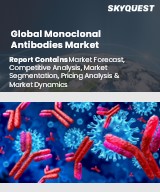
Report ID: SQMIG35H2248

Report ID:
SQMIG35H2248 |
Region:
Global |
Published Date: September, 2024
Pages:
211
|
Tables:
119 |
Figures:
75
Drivers
Increasing Rate of Chronic Diseases
Technological Developments in The Production of mAb
Restraints
High Development and Manufacturing Costs
Regulatory Barriers and Delays
Our industry expert will work with you to provide you with customized data in a short amount of time.
REQUEST FREE CUSTOMIZATIONWant to customize this report? This report can be personalized according to your needs. Our analysts and industry experts will work directly with you to understand your requirements and provide you with customized data in a short amount of time. We offer $1000 worth of FREE customization at the time of purchase.

Report ID: SQMIG35H2248